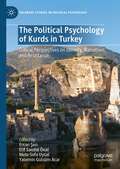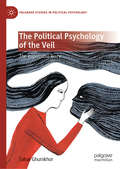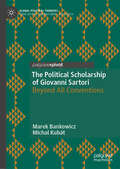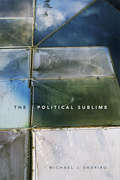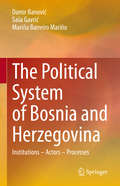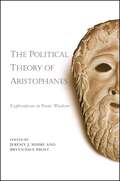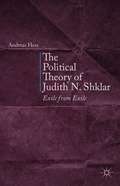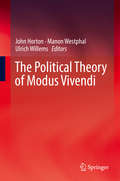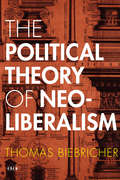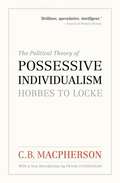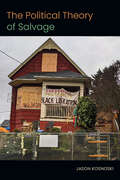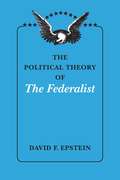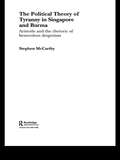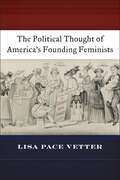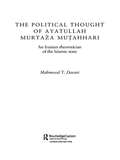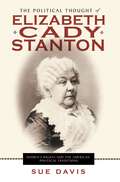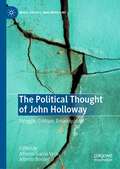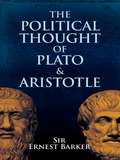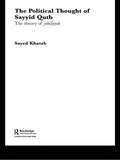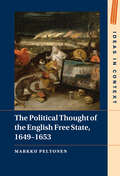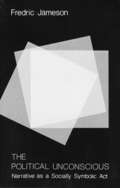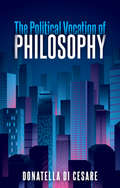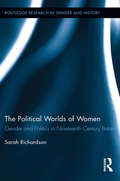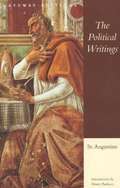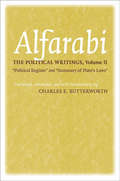- Table View
- List View
The Political Psychology of Kurds in Turkey: Critical Perspectives on Identity, Narratives, and Resistance (Palgrave Studies in Political Psychology)
by Yasemin Gülsüm Acar Ercan Şen Elif Sandal Önal Mete Sefa UysalResearch into Kurdishness touches on many of the important global issues within contemporary social and political psychology - questions about the rigors of methodology, the importance of reflexivity, issues of replicability, and the role of decolonization in research on actors in intractable conflicts. This volume will provide an in-depth account of historical and contemporary research on Kurdishness in Turkey, including research on social identity, conflict and conflict resolution, as well as collective action and resistance. It will also address methodological issues, including fieldwork in conflict zones, reflexivity in research, and intersectionality. This volume also provides lessons from related disciplines such as Kurdish studies and sociology to provide political psychologists some insight into their own research practices from disciplines wherein questions of intersectionality and reflexivity have long been ongoing.
The Political Psychology of the Veil: The Impossible Body (Palgrave Studies in Political Psychology)
by Sahar GhumkhorVeiled women in the West appear menacing. Their visible invisibility is a cause of obsession. What is beneath the veil more than a woman? This book investigates the preoccupation with the veiled body through the imaging and imagining of Muslim women. It examines the relationship between the body and knowledge through the politics of freedom as grounded in a ‘natural’ body, in the index of flesh. The impulse to unveil is more than a desire to free the Muslim woman. What lies at the heart of the fantasy of saving the Muslim woman is the West’s desire to save itself. The preoccupation with the veiled woman is a defense that preserves neither the object of orientalism nor the difference embodied in women’s bodies, but inversely, insists on the corporeal boundaries of the West’s mode of knowing and truth-making. The book contends that the imagination of unveiling restores the West’s sense of its own power and enables it to intrude where it is ‘other’ – thus making it the centre and the agent by promising universal freedom, all the while stifling the question of what freedom is.
The Political Scholarship of Giovanni Sartori: Beyond All Conventions (Global Political Thinkers)
by Michal Kubát Marek BankowiczThis book systematically analyzes Sartori&’s complete body of scholarship in English for the first time. It seeks to cover all of Sartori&’s main theories, many of which he developed in response to his dissatisfaction with the existing knowledge. The authors begin with the philosophical foundations of his work; then, they look at his conception of democracy. The authors will pause momentarily to discuss Sartori&’s general theory of dictatorship. Still, they return to democracy and its main actors, such as political parties and party systems, and to the forms of democracy, i.e., the various democratic regimes Sartori examined primarily in terms of their functionality. Finally, the book examines Sartori&’s methodology of political science and the social sciences and, in general, his view of political science and its purpose.
The Political Sublime (Thought in the Act)
by Michael J. ShapiroIn The Political Sublime Michael J. Shapiro formulates an original politics of aesthetics through an analysis of the experience of the sublime. Turning away from Kant's analysis of the sublime experience as a validation of the existence of a universal common sense, Shapiro draws on Deleuze, Lyotard, and Rancière to show how incomprehensible events and dilemmas provide openings for new political formations. He approaches the sublime through a range of artistic and cultural texts that address social crises and natural disasters, from the writing of James Baldwin and Ta-Nehisi Coates to the films of Ingmar Bergman and Spike Lee; these works suggest ways to channel the disruptive effects of the sublime into resistance to authority and innovative political initiative. Whether stemming from the threat of nuclear annihilation or the aftermath of an earthquake, the violence of racism and terrorism or the devastation of industrialism, sublime experience, Shapiro contends, allows for a rethinking of events in ways that reveal, redistribute, and create conditions of possibility for alternative communities of sense.
The Political System of Bosnia and Herzegovina: Institutions – Actors – Processes
by Damir Banović Saša Gavrić Mariña Barreiro MariñoThis book is an introduction to the basics of Bosnian political structure, institutions, and political processes. Twenty-five years after the Dayton Peace Agreement ended the Bosnian war, the political process still maintains various levels and divisions among political entities. A transitional, post-conflict, divided, multicultural, state-building society, Bosnia and Herzegovina represents a complex and unique political system through which a myriad of topics can be studied. Applying multidisciplinary and interdisciplinary methodologies, the book presents a descriptive analysis and critical evaluation of the various aspects of the political system of Bosnia and Herzegovina.The chapters address various aspects of the political system, such as institutions and state building, the legal system and the post-war constitution, as well as an examination of Bosnia and Herzegovina’s place in the international community and their relationship with European Union and NATO. Providing a holistic view of the development, politics, and policy of this unique state, this book will be ideal for students studying the contemporary history of Bosnia and Herzegovina, as well as students and researchers of political science, international relations, and development.
The Political Theory of Aristophanes: Explorations in Poetic Wisdom
by Jeremy J. Mhire; Bryan-Paul FrostThis original and wide-ranging collection of essays offers, for the first time, a comprehensive examination of the political dimensions of that madcap comic poet Aristophanes. Rejecting the claim that Aristophanes is little more than a mere comedian, the contributors to this fascinating volume demonstrate that Aristophanes deserves to be placed in the ranks of the greatest Greek political thinkers. As these essays reveal, all of Aristophanes' plays treat issues of fundamental political importance, from war and peace, poverty and wealth, the relation between the sexes, demagoguery and democracy to the role of philosophy and poetry in political society. Accessible to students as well as scholars, The Political Theory of Aristophanes can be utilized easily in the classroom, but at the same time serve as a valuable source for those conducting more advanced research. Whether the field is political philosophy, classical studies, history, or literary criticism, this work will make it necessary to reconceptualize how we understand this great Athenian poet and force us to recognize the political ramifications and underpinnings of his uproarious comedies.
The Political Theory of Judith N. Shklar: Exile From Exile
by Andreas HessJudith Shklar called for a radical shift in political theory, toward a view of the history of ideas through the lens of exile. Hess takes this lens and applies it to Shklar's own life and theoretical work.
The Political Theory of Modus Vivendi
by John Horton Manon Westphal Ulrich WillemsThis book focuses on the idea of a modus vivendi as a way of governing political life and addressing problems characterized by pluralism or deep-rooted diversity. The individual essays illustrate both the merits and the limitations of a political theory of modus vivendi; how it might be interpreted and developed; specific challenges entailed by articulating it in a convincing form; what its institutional implications might be; and how it relates to other seminal issues and concepts in political theory; such as legitimacy, toleration, the social contract, etc. The book makes a significant contribution to the discussion on the scope and limits of liberal political theory, and on how to deal politically with deep-rooted diversity.
The Political Theory of Neoliberalism (Currencies: New Thinking for Financial Times)
by Thomas BiebricherNeoliberalism has become a dirty word. In political discourse, it stigmatizes a political opponent as a market fundamentalist; in academia, the concept is also mainly wielded by its critics, while those who might be seen as actual neoliberals deny its very existence. Yet the term remains necessary for understanding the varieties of capitalism across space and time. Arguing that neoliberalism is widely misunderstood when reduced to a doctrine of markets and economics alone, this book shows that it has a political dimension that we can reconstruct and critique. Recognizing the heterogeneities within and between both neoliberal theory and practice, The Political Theory of Neoliberalism looks to distinguish between the two as well as to theorize their relationship. By examining the views of state, democracy, science, and politics in the work of six major figures—Eucken, Röpke, Rüstow, Hayek, Friedman, and Buchanan—it offers the first comprehensive account of the varieties of neoliberal political thought. Ordoliberal perspectives, in particular, emerge in a new light. Turning from abstract to concrete, the book also interprets recent neoliberal reforms of the European Union to offer a diagnosis of contemporary capitalism more generally. The latest economic crises hardly brought the neoliberal era to an end. Instead, as Thomas Biebricher shows, we are witnessing an authoritarian liberalism whose reign has only just begun.
The Political Theory of Possessive Individualism: Hobbes to Locke
by C. B. MacphersonThis seminal work by political philosopher C.B. Macpherson was first published by the Clarendon Press in 1962, and remains of key importance to the study of liberal-democratic theory half-a-century later. In it, Macpherson argues that the chief difficulty of the notion of individualism that underpins classical liberalism lies in what he calls its "possessive quality"--"its conception of the individual as essentially the proprietor of his own person or capacities, owing nothing to society for them." Under such a conception, the essence of humanity becomes freedom from dependence on the wills of others; society is little more than a system of economic relations; and political society becomes a means of safeguarding private property and the system of economic relations rooted in property. A new introduction by Frank Cunningham puts the work in a twenty-first-century context.
The Political Theory of Salvage (SUNY series in New Political Science)
by Jason KosnoskiThe use of what others have thrown away by those who squat in abandoned buildings, build neighborhoods on seeming wasteland, and occupy public spaces has been a fundamental factor in the survival of social movements during their protest activities. In The Political Theory of Salvage, Jason Kosnoski explores the political and theoretical significance of the use of salvaging discarded materials during these protests. Not only does salvage provide raw material for maintaining encampments and structures but, more importantly, this activity also encourages anti-capitalist and radical democratic consciousness. Through the use of theorists such as John Dewey, Giles Deleuze, Lauren Berlant, Henri Lefebvre, Michael Hardt, and Antonio Negri, Kosnoski suggests new possibilities for both integrating salvage more widely into left political practice and rethinking organizational questions that have vexed contemporary anti-capitalist movements.
The Political Theory of The Federalist
by Epstein David F.In The Political Theory of “The Federalist,” David F. Epstein offers a guide to the fundamental principles of American government as they were understood by the framers of the Constitution. Epstein here demonstrates the remarkable depth and clarity of The Federalist’s argument, reveals its specifically political (not merely economic) view of human nature, and describes how and why the American regime combines liberal and republican values. “While it is a model of scholarly care and clarity, this study deserves an audience outside the academy. . . . David F. Epstein’s book is a fine demonstration of just how much a close reading can accomplish, free of any flights of theory or fancy references. ”—New Republic “Epstein’s strength lies in two aspects of his own approach. One is that he reads the text with uncommon closeness and sensitivity; the other is an extensive knowledge of the European political thought which itself forms an indispensable background to the minds of the authors. ”—Times Literary Supplement
The Political Theory of Tyranny in Singapore and Burma: Aristotle and the Rhetoric of Benevolent Despotism (Routledge Contemporary Southeast Asia Series #Vol. 8)
by Stephen McCarthyCovering various fields in political science, this new book presents an historical and political-cultural analysis of Buddhism and Confucianism. Using Singapore and Burma as case studies, the book questions the basic assumptions of democratization theory, examining the political science of tyranny and exploring the rhetorical manipulation of religion for the purpose of political legitimacy. A welcome addition to the political science and Asian studies literature, McCarthy addresses many of the current issues that underlie the field of democratization in comparative politics and discusses the issue of imposing Western cultural bias in studying non-Western regimes by analyzing rhetorical traits that are universally regular in politics.
The Political Thought of America’s Founding Feminists
by Lisa Pace VetterRecovering the powerful and influential contributions of women from the nation’s formative yearsThe Political Thought of America’s Founding Feminists traces the significance of Frances Wright, Harriet Martineau, Angelina and Sarah Grimké, Lucretia Mott, Elizabeth Cady Stanton, and Sojourner Truth in shaping American political thinking. These women understood the relationship between sexism, racism, and economic inequality; yet, they are virtually unknown in American political thought because they are considered activists, not theorists. Their efforts to expand the reach of America’s founding ideals laid the groundwork not only for women’s suffrage and the abolition of slavery, but for the broader expansion of civil, political, and human rights that would characterize much of the twentieth century and continues to unfold today. Drawing on a careful reading of speeches, letters and other archival sources, Lisa Pace Vetter shows the ways in which the early women’s rights movement and abolitionism were central to the development of American political thought. The Political Thought of America’s Founding Feminists demonstrates that early American political thought is incomplete without attention to these important female thinkers, and that an understanding of early American women’s movements is incomplete without considering its profound impact on political thought. A complex and thoughtful guide to the indispensable role of women in shaping the American way of life, The Political Thought of America’s Founding Feminists is essential for a comprehensive understanding of the history of American political thought.
The Political Thought of Ayatollah Murtaza Mutahhari: An Iranian Theoretician of the Islamic State (Routledge/BIPS Persian Studies Series)
by Mahmood T. DavariAyatollah Murtaza Mutahhari was a significant figure in the movement which brought the Islamic Republic of Iran into being. Mutahhari, a student of Ayatollah Khomeini and particularly close to his mentor, had broad theoretical concerns regarding religion, society and economy. He is generally considered as a prominent contemporary intellectual figure among the Iranian and Shi'ite scholars of the time. This book describes the life and works of this philosopher, jurist, preacher and writer, who was educated in the Qum Seminary and worked in Tehran.
The Political Thought of Elizabeth Cady Stanton: Women's Rights and the American Political Traditions
by Sue Davis2009 Choice Outstanding Academic TitleElizabeth Cady Stanton (1815-1902) was not only one of the most important leaders of the nineteenth century women’s rights movement but was also the movement’s principal philosopher. Her ideas both drew from and challenged the conventions that so severely constrained women’s choices and excluded them from public life.In The Political Thought of Elizabeth Cady Stanton, Sue Davis argues that Cady Stanton’s work reflects the rich tapestry of American political culture in the second half of the nineteenth century and that she deserves recognition as a major figure in the history of political ideas. Davis reveals the way that Cady Stanton’s work drew from different political traditions ranging from liberalism, republicanism, inegalitarian ascriptivism, and radicalism. Cady Stanton’s arguments for women’s rights combined approaches that in contemporary feminist theory are perceived to involve conflicting strategies and visions. Nevertheless, her ideas had a major impact on the development of the varieties of feminism in the twentieth century. Thoroughly researched and engagingly written, The Political Thought of Elizabeth Cady Stanton draws on a wide variety of primary and secondary sources and promises to fill a gap in the literature on the history of political ideas in the United States as well as women’s history and feminist theory.
The Political Thought of John Holloway: Struggle, Critique, Emancipation (Marx, Engels, and Marxisms)
by Alfonso García Vela Alberto BonnetThis book provides renewed reflection and critical discussion on John Holloway's political and theoretical thought. Two decades ago, in Change the World without Taking Power, Holloway set out on a path that he followed a decade later in Crack Capitalism and continues to walk today with his new book, Hope in Hopeless Times. The contributions in this volume critically analyze his innovative attempt to rethink the meaning and dynamics of revolution in the conditions of contemporary capitalism. More than ten years after the publication of Crack Capitalism, this volume aims to question Holloway's attempt, as well as his theoretical foundations in his original rereading of Marxism and Critical Theory and their relations with the characteristics adopted by the anti-capitalist struggles during the last two decades. Its authors, from different geographies, traditions, and scientific disciplines, establish throughout its pages a fruitful dialogue convened by Holloway's innovative ideas.
The Political Thought of Plato and Aristotle
by E. BarkerThis clear and accurate exposition of Greek political thought offers a comprehensive exploration of the works of Plato and Aristotle. Students of political science and the history of Western philosophy will appreciate its insights into the sources of state power, the nature of political organization, the aims of the state, citizenship, justice, law, and related concepts. In addition to point-by-point discussions of Plato's Republic and Aristotle's Politics, this survey presents critical examinations of several of Plato's other dialogues along with Aristotle's Ethics. Further, it considers the origin of these ideas in the Greek political experience and in the contributions of other Greek theorists, including Heraclitus, Pythagoras, the Cyrenaics, and the Encyclopaedists. This classic of scholarship also includes epilogues that discuss the influence of Greek political ideas on such thinkers as Aquinas, Marsilio of Padua, Machiavelli, Spinoza, Hobbes, Rousseau, and Hegel.
The Political Thought of Sayyid Qutb: The Theory of Jahiliyyah (Routledge Studies in Political Islam)
by Sayed KhatabThis new book takes a literary approach in its study of Sayyid Qutb, one of the most significant political thinkers for contemporary Islamists and who has greatly influenced the likes of Osama Bin Laden. Executed by the Egyptian state in 1966, his books continue to be read and his theory of jahiliyya ‘ignorance’ is still of prime importance for radical Islamic groups. Through an examination of his thoughts and theories, the book explores the main concepts that are used by today’s radical fundamentalist movements, tracing the intellectual origins, as well as the conceptual and methodological thinking of radical Islamist movements in the modern world. The book sheds light on Islamic radicalism and its origins by presenting new analysis on the intellectual legacy of one of the most important thinkers of the modern Islamic revival. This is an invaluable new book for our time.
The Political Thought of the English Free State, 1649–1653 (Ideas in Context)
by Markku PeltonenEnglish republicanism has long been a major theme in the history of political thought, but the years of the English free state are often overlooked. Drawing on a wide range of sources, including the vast political pamphlet literature of the era, The Political Thought of the English Free State, 1649–1653 offers a provocative reassessment of the English Revolution and an original new perspective on English republicanism. Markku Peltonen explores the arguments in defence of the English free state and demonstrates the profound importance of the republican period. The pamphleteers who defended the free state maintained that the people, or their representatives, could alter the form of government whenever they deemed it advantageous, put forward powerful anti-monarchical arguments and widely shared the republican conviction that individual freedom could only materialise in a free state. Peltonen also highlights the unprecedented debate over whether the free state was an aristocracy or democracy and shows how, for the first time in English history, democracy was not only robustly defended but understood as representative.
The Political Unconscious: Narrative as a Socially Symbolic Act
by Fredric JamesonFredric Jameson, in The Political Unconscious, opposes the view that literary creation can take place in isolation from its political context. He asserts the priority of the political interpretation of literary texts, claiming it to be at the center of all reading and understanding, not just a supplement or auxiliary to other methods current today. Jameson supports his thesis by looking closely at the nature of interpretation. Our understanding, he says, is colored by the concepts and categories that we inherit from our culture's interpretive tradition and that we use to comprehend what we read. How then can the literature of other ages be understood by readers from a present that is culturally so different from the past? Marxism lies at the foundation of Jameson's answer, because it conceives of history as a single collective narrative that links past and present; Marxist literary criticism reveals the unity of that uninterrupted narrative. Jameson applies his interpretive theory to nineteenth- and twentieth-century texts, including the works of Balzac, Gissing, and Conrad. Throughout, he considers other interpretive approaches to the works he discusses, assessing the importance and limitations of methods as different as Lacanian psychoanalysis, semiotics, dialectical analysis, and allegorical readings. The book as a whole raises directly issues that have been only implicit in Jameson's earlier work, namely the relationship between dialectics and structuralism, and the tension between the German and the French aesthetic traditions. The Political Unconscious is a masterly introduction to both the method and the practice of Marxist criticism. Defining a mode of criticism and applying it successfully to individual works, it bridges the gap between theoretical speculation and textual analysis.
The Political Vocation of Philosophy
by Donatella Di CesareIt is time for philosophy to return to the city. In today’s crisis-ridden world of globalised capitalism, increasingly closed in on itself, it may seem harder than ever to think of ways out. Philosophy runs the risk of becoming the handmaiden of science and of a hollowed-out democracy. Donatella Di Cesare calls on philosophy instead to return to the political fray and to the city, the global pólis, from which it was banished after the death of Socrates. Suggesting a radical existentialism and a new anarchism, Di Cesare shows that Western philosophy has been characterised by a political vocation ever since its origins in ancient Greece, and argues that the separation of philosophy from its political roots robs it of its most valuable and enlightening potential. But critique and dissent are no longer enough. Mindful of a defeated exile and an inner emigration, philosophers should return to politics and forge an alliance with the poor and the downtrodden. This passionate defence of the political relevance of philosophy and its radical potential in our globalised world will be of great interest to students and scholars of philosophy and to a wide general readership.
The Political Worlds of Women: Gender and Politics in Nineteenth Century Britain (Routledge Research in Gender and History #12)
by Sarah RichardsonTraditional analyses of nineteenth-century politics have assigned women a peripheral role. By adopting a broader interpretation of political participation, the author identifies how middle-class women were able to contribute to political affairs in the nineteenth century. Examining the contribution that women made to British political life in the period 1800-1870 stimulates debates about gender and politics, the nature of authority and the definition of political culture. This volume examines female engagement in both traditional and unconventional political arenas, including female sociability, salons, child-rearing and education, health, consumption, religious reform and nationalism. Richardson focuses on middle-class women’s social, cultural, intellectual and political authority, as implemented by a range of public figures and lesser-known campaigners. The activists discussed and their varying political, economic and religious backgrounds will demonstrate the significance of female interventions in shaping the political culture of the period and beyond.
The Political Writings of St. Augustine
by Saint Augustine Henry PaolucciThe political ideas of St. Augustine, no less than his ideas on sin, grace, and predestination, have long been an object of controversy.
The Political Writings, Volume II: "Political Regime" and "Summary of Plato's Laws"
by Charles E. Butterworth AlfarabiAlfarabi (ca. 870-950) founded the great tradition of Aristotelian/Platonic political philosophy in medieval Islamic and Arabic culture. In this second volume of political writings, Charles E. Butterworth presents translations of Alfarabi's Political Regime and Summary of Plato's "Laws" , accompanied by introductions that discuss the background for each work and explore its teaching. In addition, the texts are carefully annotated to aid the reader in following Alfarabi's argument. An Arabic-English/English-Arabic glossary allows interested readers to verify the way particular words are translated. Throughout, Butterworth's method is to translate consistently the same Arabic word by the same English word, rendering Alfarabi's style in an unusually faithful and yet approachable manner. Political Regime consists of two parts. One focuses on nature and natural existing things as well as the principles beyond nature that guide the existing things. In the second part, the exposition centers on human beings and their place in the larger cosmic whole as well as on how a proper organization of human life in political association provides the conditions whereby human beings might achieve their purpose. Summary of Plato's "Laws" gives an account of the first nine books of Plato's Laws. Alfarabi explains Plato's art of writing in general and the method he follows in writing the Laws in particular. Unlike Alfarabi's other works, which examine the place of legislation and laws in the broader context of political philosophy, the Summary is a more specialized study of the question of laws and how and why they are formulated, with a particular focus on the relevance of Plato's investigation concerning Greek divine laws for the study and understanding of all divine laws.
